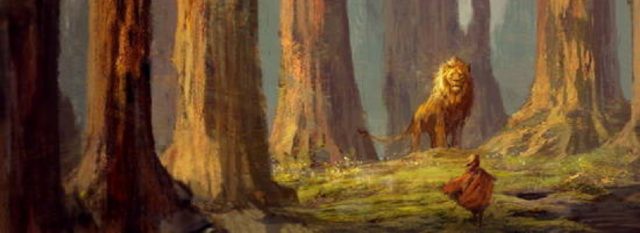
“‘Till We Have Faces” is not the only myth Lewis retold. In fact, he loved retelling myths. And while you may have noted the conspicuous presence of Bacchus at the end of Prince Caspian and the amazing feast that follows, you may not have caught some of the other details Lewis wove into his retelling of the Bacchae. That is precisely what I would like to suggest Lewis was doing:
Retelling Euripides’ great story in Prince Caspian.
Superficially, we have the presence of Bacchus in the chapter “How All Were Very Busy,” as Lewis liberates the river-god from his chains. Noteworthy, too, is the wild dance and feast that follows in “Aslan Makes a Door in the Air.” But these are just details.
Far more interesting is the central tension of the book: that the God figure both hides and reveals himself as an act of revelation and judgment.
In the Bacchae, the problem is the fact that Pentheus is blind to the presence and reality of the gods, and so treats Dionysus with disdain, resulting in his eventual judgment. And this, of course, is the same basic story we find in Prince Caspian: virtually no one in Narnia believes in Aslan. King Miraz and his people fear the old myths but don’t believe in them and many of the dwarves have ceased to believe. All of this comes to a head in the beautifully painful story where Lucy is forced to choose between following Aslan, whom she can see, and staying with the others, who cannot see him.
The problem, in both stories, is one of sight.
But in both stories, regardless of whether there is sight, people follow the god. Pentheus follows Dionysus, and the children and Trumpkin follow Lucy— but they do so impiously, for a mixed range of reasons, none having to do with a genuine faith in the god.
The terrible thing, however, is that as these impious followers actually follow the god, the following is what opens their eyes. As Pentheus follows behind Dionysus (in order to spy on the women in the hills), he says:
I seem to see two suns blazing in the heavens.
And now two Thebes, two cities, and each
With seven gates. And you—you are a bull
Who walks before me there. Horns have sprouted
From your head. Have you always been a beast?
Well, now you have become a bull. Ln. 918-923
This is essentially what happens with the Pevensie children as they follow Lucy and Aslan. One by one, they begin to see first a shadow, then the shadowy form, and finally Aslan himself, great and terrible. In both authors, we find a connection between following and sight, with the former preceding the latter.
But this is where the authors part ways.
In the Bacchae, we see that sight is merely a prelude or a means of judgment. The god reveals himself not for the sake of, but for the utter humiliation and judgment of Pentheus, who is shortly thereafter torn limb from limb by his mother and the women of the city.
With Lewis, we find something rather different in the character of Trumpkin:
“And now, where is this little Dwarf, this famous swordsman… who doesn’t believe in Lions? Come here, Son of Earth, come Here!” and the last word was no longer the hint of a roar, but almost the real thing.
“Wraiths and wreckage,” gasped Trumpkin in the ghost of a voice. The children, who knew Aslan well enough to see that he liked the Dwarf very much, were not disturbed; but it was quite another thing for Trumpkin who had never seen a lion before, let along this Lion. He did the only sensible thing he could have done; that is, instead of bolting, he tottered towards Aslan.
Aslan pounced. Have you ever seen a very young kitten being carried in the mother-cat’s mouth? It was like that…. The Lion gave him one shake and all his armour rattled like a tinker’s pack and then—hey-presto—the Dwarf flew up in the air. He was as safe as if he had been in bed, though he did not feel so. As he came down the huge velveted paws caught him as gently as a mother’s arms and set him (right way up, too) on the ground.
“Son of Earth, shall we be friends?” asked Aslan. 128-9
Lewis’ story ends ends quite differently.
Where Euripides explores the idea of doing the right thing (following the god) for the wrong reason as a means judgment and punishment, where the sight that follows proper action is a means to punishment, Lewis does the opposite: right action, even if for the wrong reason, is connected to Aslan revealing himself, and offering himself in friendship. This, of course, is not without some judgement, but right-action for the wrong reason opens the door to sight, and eventual friendship.
The problem, in short, seems to be a combination of hardness of heart, blasphemy, and misplaced worship. But interestingly, the solution seems to be doing the right thing for the wrong reason. Even such conflicted action is enough of a good thing to put other forces in motion, and to serve as the means by which our sight is opened, and friendship can be restored. Loving action, it seems, can be part of the movement to love itself and eventual belief (such as we findin the Brothers Karamozov) or virtuous action can serve as part of the gateway to the Christian life (such as we find in George Herbert’s “Church Porch”).
Originally published on November 22, 2017. Image Cedit: Justin Sweet.